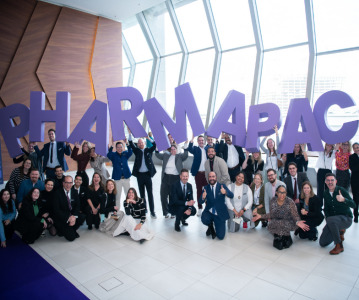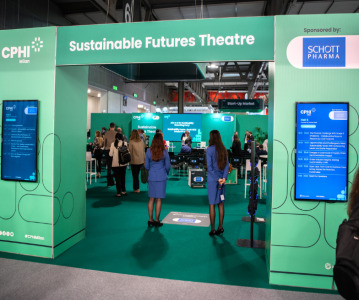CPHI Middle East 2024 – What do we have to look forward to?
.png)
We’re bringing CPHI to the Middle East in December 2024. CPHI brings together the pharma community from all over the world, creating a platform for education, collaboration, and progress.
The Middle East and North Africa region is rapidly growing in many areas, but especially in healthcare and pharmaceuticals, and as it stands at the minute it is the 5th largest regional pharma market. By hosting CPHI Middle East in Riyadh, Saudi Arabia, we’ll be able to provide this platform in a new region, opening the door for partners to come together and continue to advance innovation across the region.
What makes Saudi Arabia a pharma phenomenon?
Saudi Arabia has outlined an ambitious strategy for transforming the life sciences and healthcare sector in the coming years. Vision 2030 is a development roadmap set to nurture novel ideas, stimulate domestic manufacturing and foster an eco-system which supports innovation and establishes the Kingdom as a leader on the global pharma stage.
Saudi Arabia is already home to more than 140 pharmaceutical companies, including a host of international partners fromsed in India, China, and the USA acknowledging the growth potential in the area by investing in manufacturing sites in the MENA region. The economic advantages of such diversification efforts will be easy to see as the pharma market here is already predicted to reach US$60 billion by 2025, characterised by an increase in healthcare expenditure, rising demands for medicines, and a high concentration of healthcare professionals as well as pharmaceutical companies. In fact, the region boasts a projected growth rate of 10%, which is greater than the global growth rate of 4–6% and notably also greater than other world economies in Brazil and China [1].
Some of the largest, multinational pharmaceutical companies have already taken the leap and established themselves in the MENA region, with Sanofi, Novartis and GSK dominating the top 3 spots in the rankings [1]. Where these companies have developed partnerships shows that it’s a breeding ground for collaborative, forward thinking, and with many partnerships being formed with arms of the government there this shows promising steps being taken towards a successful and unified vision for the sector. In the UAE Bayer partners with the Ministry of Health with the aim of developing the capabilities of the components of the medical system, from suppliers to regulators by way of educating people about health economics. In Saudi Arabia, GSK started a healthcare and drug localisation partnership with the Ministry of Investment, to boost investment in healthcare in the country and to define Saudi Arabia as a centre for self-care and drug research [1].
What are some of the key areas of focus?
Certain topics are emerging from the region that are set to dominate the future pharma landscape in Saudi Arabia. Helpfully, the region has already categorised these into a defined strategy that they are hoping to roll out over the next few years, with each branch representing a key area of health innovation with globally-reaching benefits. The National Biotechnology Strategy is split into sections covering vaccines, biomanufacturing and localisation, and genomics [2].
Vaccines – to increase self-sufficiency and access to medicine across the entire MENA region, Saudi Arabia is investing in an end-to-end vaccine manufacturing programme. The programme includes ongoing research into new technologies for the development of vaccines, as well as logistics planning to ensure the ease of exports across the whole region.
Biomanufacturing and localisation – to establish themselves as a leader in biologics and biosimilars, the area is developing an advanced biomanufacturing platform, on a local scale. By becoming more self-reliant in this field, with focuses on each aspect of the value chain, the country will be better able to meet their growing healthcare needs whilst reducing costs, and it puts them in a good position to become a leader in specialised exports.
Genomics – a key field in considering the future of healthcare on a localised and global scale respectively. Adding information to genomics databases will only have a positive impact on amassing knowledge about people’s health and it will lead to the development of more advanced and accurate medicines.
Saudi Arabia is also home to the Saudi Human Genome Programme. This project, started in 2018, is a continuation of other genome projects to map the human genome, but importantly, achieving this in populations across the globe to map out the variations in DNA sequences that can be used to identify trends in disease risk in diverse populations. Most human genome research has been conducted on people of European descent but new studies are focusing on those with other backgrounds, to give more of an insight into human variation, which can lead to more understanding when it comes to treating individuals.
These strategies all link together to set Saudi Arabia up as a leading biotech hub, aiming to bring about their goals – VISION 2030 – where the government hopes to create a strong foundation for a thriving and vibrant community.
The potential to lead the way in regulation
Regulation in the Middle East represents an exciting opportunity, firstly for the region but also with a view to pave the way for other countries. The Gulf Cooperation Council (GCC), the regional, intergovernmental, political, and economic union involving Bahrain, Kuwait, Oman, Qatar, Saudi Arabia, and the United Arab Emirates was established in 1981. Since then, the GCC has sort to harmonise proceedings throughout the participating countries, including running pharmaceutical tenders.
The Gulf Central Committee for Drug Registration (GCC-DR), established in 1999, is overseen by a different member country each year and is responsible for various regulatory aspects in the pharmaceutical industry from manufacturing site registration to drug renewals. The trademark drug registrations are handled by the regional patent office based in Riyadh, making Saudi Arabia a focal point for drug purposing and innovation. With large pharma companies moving operations here, and potentially in the future away from the USA, there is scope for Saudi Arabia to be a trailblazer for novel drug development and approval [1].
A sustainable roadmap
Sustainability is another exciting area for growth and leadership for the Middle East. As a whole, the region is obviously responsible for a large proportion of global oil production, but as everyone is aware this is a main contributor to global warming and a finite resource at that. Therefore, Saudi Arabia is steadily moving to invest in other areas, such as healthcare and pharmaceuticals, to decrease its reliance on oil, and towards more sustainable practices for the planet.
It’s yet another field where Saudi Arabia can broach new ground and make impactful developments, COP28 in 2023 heralded a new era for climate action surrounding healthcare in particular, championed by the Middle East. Future developments in the country are also driving rapid innovations in sustainability, particularly surrounding water and energy consumption and conversation, and renewables [3].
What to expect at CPHI Middle East
The event itself will feature exhibitors from the whole MENA region and beyond, with attendees able to meet partners and nurture burgeoning relationships with start-ups, have access to our full range of on-site content in the conference portion of the show, see key takeaways on sustainability, and bring together all aspects of the value chain to work together towards innovative solutions for the industry. The pharma ecosystem in Saudi Arabia shows great potential, but is still relatively fragmented, CPHI Middle East presents a golden opportunity to bring all elements together to create a more cohesive and resilient pharma outlook.
April Hung, Brand Manager, CPHI Middle East, at Informa Markets shares enthusiasm for the upcoming event:
“CPHI Middle East is the pharma event everyone in the region is waiting for. Our clients are thrilled about Saudi government plans like VISION 2030, NEOM, and the National Biotechnology Strategy. These initiatives will open numerous opportunities for Saudi Arabia and the Middle East. We see these opportunities happen every day with our clients already. CPHI Middle East will be the platform for our global pharma community to grow business and create partnerships in the Middle East. We are very excited and can’t wait to see you in Riyadh with us”.
For more information about the event and to register, see here.
If you’re attending LEAP at Riyadh Exhibition and Convention Center in Malham, Saudi Arabia from 4–7th March 2024 and you’re also interested in discussing further opportunities at CPHI Middle East, contact Tara Dougal, Director of Content – Pharma, for a meeting.
References
[1] Research conducted by the CPHI Customer Insights team 2022. Market Attractiveness Pharma - Gulf Region.
[2] Vision 2030. National Biotechnology Strategy. [Date accessed 22/02/2024] www.vision2030.gov.sa/en/explore-more/national-biotechnology-strategy/
[3] Omnia Health. Sustainability in healthcare: Developments in Saudi Arabia. [Date accessed 23/02/2024] https://insights.omnia-health.com/saudi-arabia/sustainability-healthcare-developments-saudi-arabia
Related News
-
News Pfizer may shift production back to US under Trump pharma tariffs
At the 45th TD Cowen annual healthcare conference in Boston, USA, Pfizer CEO Albert Bourla outlined the potential for Pfizer to shift its overseas drug manufacturing back to the US as pharmaceutical industry players weigh their options against Presiden... -
News Women in Pharma: Connecting accessible pharma packaging to patients – a Pharmapack Special
Throughout our Women in Pharma series, we aim to highlight how CPHI events encourage discussions around diversity, equity, and inclusion initiatives in the pharmaceutical industry. -
News CPHI Podcast Series: Packaging expert perspectives at Pharmapack 2025
This month's podcast episode sounds a little different, covering the latest event in Paris – Pharmapack 2025. Digital Editor Lucy Chard speaks to several experts direct from the floor of the show, bringing you right in on the action.&nbs... -
News Closing 2024 with Editors' picks of top articles from the past year
Coming to the end of 2024 and it’s certainly been a busy year, for CPHI and for the rest of the pharmaceutical and healthcare industry. Topics of conversation throughout the last 12 months have been varied, touching on the technical, to the polit... -
News SCHOTT Pharma’s sustainable journey with CPHI
Sustainability is of paramount importance in the pharmaceutical industry. See how a recent partnership between CPHI and SCHOTT Pharma has helped to highlight and accelerate their sustainability journey to reach global goals. -
News CPHI Podcast Series: Investing in a vision for the future of life sciences
In this episode Lucy Chard is joined by Rajiv Khatau to discuss the importance of looking into new therapeutic areas and some of the more niche areas of pharmaceuticals, and investing in the future of the industry. -
News Lessons from CPHI Milan 2024: Sunny Intervals for Pharma Manufacturing?
As the 2024 CPHI conference wrapped up in Milan, we caught up with L.E.K. Consulting – a global strategy consulting firm with deep expertise in pharma manufacturing – to discuss evolving market perspectives and business outlook. -
News Women in Pharma: Reflections from Behind the Scenes
In this instalment of our monthly series, the team that brings you the Women in Pharma series each month sits down for a heart-to-heart on what the series means to them, and how they hope to continue their work in the future.
Recently Visited
Position your company at the heart of the global Pharma industry with a CPHI Online membership
-
Your products and solutions visible to thousands of visitors within the largest Pharma marketplace
-
Generate high-quality, engaged leads for your business, all year round
-
Promote your business as the industry’s thought-leader by hosting your reports, brochures and videos within your profile
-
Your company’s profile boosted at all participating CPHI events
-
An easy-to-use platform with a detailed dashboard showing your leads and performance







